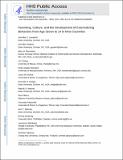Parenting, Culture, and the Development of Externalizing Behaviors from Age Seven to 14 in Nine Countries

View/
Publication Date
2018Author
Jennifer E Lansford, Jennifer Godwin, Marc H Bornstein, Lei Chang, Kirby Deater-Deckard, Laura Di Giunta, Kenneth A Dodge, Patrick S Malone, Paul Oburu, Concetta Pastorelli, Ann T Skinner, Emma Sorbring, Laurence Steinberg, Sombat Tapanya, Liliana Maria Uribe Tirado, Liane Peña Alampay, Suha M Al-Hassan, Dario Bacchini
Metadata
Show full item recordAbstract/
Using multilevel models, we examined mother-, father-, and child-reported (N = 1,336 families)
externalizing behavior problem trajectories from age seven to 14 in nine countries (China,
Colombia, Italy, Jordan, Kenya, the Philippines, Sweden, Thailand, and the United States). The
intercept and slope of children’s externalizing behavior trajectories varied both across individuals
within culture and across cultures, and the variance was larger at the individual level than at the
culture level. Mothers’ and children’s endorsement of aggression as well as mothers’ authoritarian
attitudes predicted higher age 8 intercepts of child externalizing behaviors. Furthermore,
prediction from individual-level endorsement of aggression and authoritarian attitudes to more
child externalizing behaviors was augmented by prediction from cultural-level endorsement of
aggression and authoritarian attitudes, respectively. Cultures in which father-reported endorsement
of aggression was higher and both mother- and father-reported authoritarian attitudes were higher
also reported more child externalizing behavior problems at age 8. Among fathers, greater
attributions regarding uncontrollable success in caregiving situations were associated with steeper
declines in externalizing over time. Understanding cultural-level as well as individual-level
correlates of children’s externalizing behavior offers potential insights into prevention and
intervention efforts that can be more effectively targeted at individual children and parents as well
as targeted at changing cultural norms that increase the risk of children’s and adolescents’
externalizing behavior
Collections
- Department of Psychology [216]
